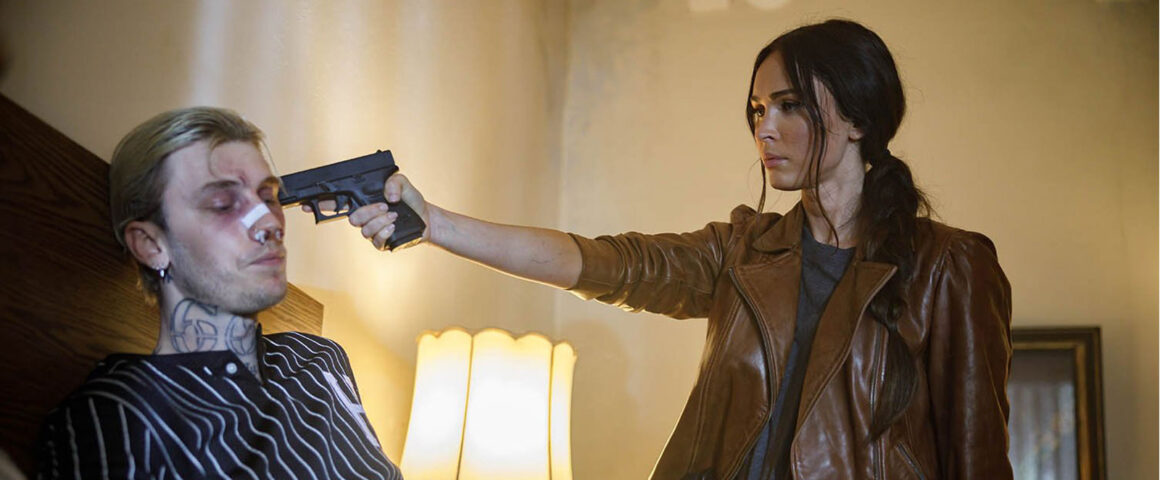The serial killer narrative has been done to death, in TV series and movies. Within this sub-genre — that combines thriller and horror — there are masterpieces, there are turkeys and there’s the rest, that lack brilliance but offer some enjoyment. More specifically, homicide detective narratives set in small town or rural America veer from the sublime like “True Detective” to the mediocre “Texas Killing Fields” and “Out of Time” to the ridiculous.
The opening sequence of Randall Emmett’s Midnight in the Switchgrass echoes these previous dramas and offers promise. Aerial shots over the evocative landscape of Pensacola, Florida are accompanied by a voiceover from Byron Crawford (Emile Hirsch, “Once Upon a Time . . . in Hollywood”), ruminating on hunters, prey and the shifting position of humans. We then cut to the discovery of a body, and while the opening is clichéd it does offer genre pleasures that raise goodwill in the viewer. This goodwill continues in the following scene, as a long take presents Tracey Lee (Caitlin Carmichael, “Epiphany”) as she emerges from a motel room in a drugged state, making her way through a parking lot en route to further plot developments.
The goodwill is perpetuated by a possible interest in the under-explored and potentially interesting aspect of this type of narrative — the position of the victim. Perhaps Emmett and writer Alan Horsnail will offer more than the disturbing serial killer or the devoted cop. It all looks promising.
The goodwill and promise lasts for about ten minutes. Consequently, telegraphed scene follows telegraphed scene and a set of disparate storylines take off in clumsily stitched together directions. Florida Department of Law Enforcement officer Byron has been investigating a series of murders that he believes are the work of the same killer. He is very devoted, because of course he is. FBI agents Rebecca Lombardi (Megan Fox, “Till Death”) and Karl Helter (Bruce Willis, “Trauma Center,” who might as well have said “Where’s my check?” instead of his dialogue) conduct a sting operation regarding sex trafficking in search of a particular perpetrator. Rebecca is committed to helping women because they could have been her, because of course she is. Karl is, there. And truck driver Peter Hillsborough (Lukas Haas, “First Man”) is the sick bastard that both state and federal law enforcement agencies are looking for. And there’s the Sheriff’s department detective (Michael Beach, “Inheritance”) who goes on about his jurisdiction and wants no involvement from other agencies.
With the goodwill squandered, Midnight in the Switchgrass then takes its viewer thoroughly into the ridiculous. The reveal of Peter as the killer early on is not necessarily a problem, but the film takes the trouble to show that Peter is a loving father and husband, in such a way as to hammer the point again and again that the serial killer “seemed like such a nice, normal person” but is really a monster. Yes, got it. The script lacks the context or world-building to create proper juxtaposition — with Peter established early on as creepy, the film has nowhere to go but into depravity, which needs to be handled with care and precision. Emmett is no David Fincher and the descent (literally) is not so much steady as lurching.
In the other narrative strands, Hirsch’s Byron could have been an interesting protagonist, but Horsnail gives him little to do beyond lamenting to his wife that he does not feel the presence of God, while she complains about the absence of Byron. Willis is barely in the film and seems bored: There is one scene ostensibly between Karl and Rebecca, but Willis is largely out of shot and the speaker actually sounds like someone else, suggesting a reshoot without the principal actor. Fox tries her best but the script denies Rebecca agency, lumping her with a backstory pulled from the file marked “tough girl with daddy issues” and then placing her in a painfully obvious situation.
The treatment of Rebecca highlights a nasty and exploitative strand of misogyny within the film. As mentioned earlier, it could be interesting to explore the victims’ perspective, especially as we see kidnap as well as murder. But the film takes the killer’s perspective, frequently aligning the viewer with Peter and seeming to revel in his cruelty. Despite characters insisting that “she’s so strong” and “these women can do much,” this is still very much a man’s story about how men treat women. Some men treat women well and others treat them badly, but the film as a whole treats them badly. It comes across therefore as cheap and lazy, boring as well as distasteful.
To make matters worse, aside from that promising long take, the film is garishly shot. Leering point-of-view shots, distracting filters and tedious montages seem designed to stretch things out and make the whole experience more turgid, robbing Midnight in the Switchgrass of tension and forward momentum. It is also clumsily edited, with pointless insert shots of the titular switchgrass and some (mercifully brief) action sequences that offer neither a coherent space nor a visceral thrill. Add all this incompetence together and you have a thriller that fails to deliver thrills or atmosphere, while also presenting some depressingly retrograde attitudes.



